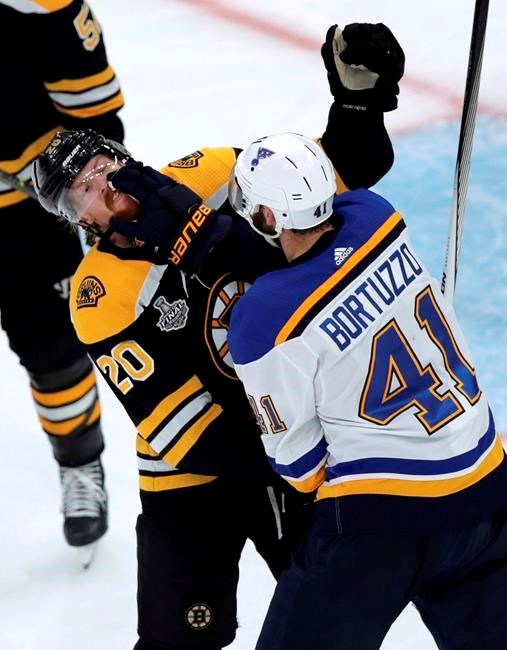Something is missing from Boston's power play.
The uninterrupted puck movement and cross-ice passes to a wide-open David Pastrnak aren't there anymore. Torey Krug isn't getting the chance to fire away from the top. Patrice Bergeron isn't dominating between the faceoff circles like before.
Boston rode its power play to a 2-1 lead in the Stanley Cup Final. Since then, the St. Louis Blues have shut out the most effective power-play unit in more than 30 years and held the Bruins' best players in check, too. The Blues' power play has been nothing special, but their penalty kill is a major reason why St. Louis has won two straight to earn a chance to claim the first NHL championship in franchise history at home Sunday night in Game 6.
St. Louis has gone from being the playoffs' least-penalized team through three rounds to something else entirely. The Blues are borderline undisciplined, relying on targeted toughness to beat up and disrupt the Bruins. It's working. Since allowing six power-play goals early in the final and letting the Bruins go 4-for-4 on four shots in Game 3, the Blues have made five successful penalty kills.
Suddenly Boston's most valuable weapon is quiet.
"We're staying tight to each other," Blues penalty killer Oskar Sundqvist said. "We're not letting them pass through the seams and shoot from the top and things like that. We're making it harder on them and keeping them on the outside. We just need to keep doing the same thing and we're probably going to be fine if we do that."
Not just fine. If this keeps up, they could be Stanley Cup champions.
Game 3 was such an eye-opener of how good Boston's power play is that many wondered if the Bruins were just going to steamroll the Blues and win the series in five games. But Sundqvist was suspended that game and goaltender Jordan Binnington has shown serious resolve since then. Blues coach Craig Berube also has made adjustments to counter Boston coach Bruce Cassidy's special teams.
"They really like using seam passes and things like that, and I thought we were tight and doing a good job with our sticks and doing a real good job on our stand at the blue line on their breakouts and breaking plays up," Berube said.
Boston's power play had been converting over 30% — a clip that could have been the second-highest all-time for a Cup champion — and was drawing comparisons to the New York Islanders' 1980s dynasty that featured Mike Bossy, Denis Potvin, Clark Gillies and Bryan Trottier.
"Back then it was more drop-off, backdoor, overload ... a lot more point shots," Cassidy said. "Little more low-to-high driven net-on-net, whereas now I think you see a lot more power plays, certainly always the half wall is a big thing. But I would guess more net-front tips, rebounds back then. Now it's more one-timer, seam passes."
Krug considers Cassidy a power-play mastermind, and that will be tested with the Bruins facing elimination Sunday for the first time since Game 7 in the first round against Toronto.
"I think in zone, they've been tight," Cassidy said of the Blues. "Either got to stretch them out to get some seams or we got to be less stubborn, then get a net presence and take the shot that's available with that net presence. Maybe stretch them out off of puck recovery. A little bit is on us to make sure — 'us' the staff — and it's on the players to make the right decision at the right moment in time."
Getting the power play righted is key to staving off elimination. And it's not just about scoring because the power play fuels the Bruins' 5-on-5
"Any time you don't get chances on the power play, you're going to get frustrated," Blues captain Alex Pietrangelo said. "So we're just doing our job."
St. Louis has done a much better job at maintaining defensive assignments on the penalty kill after inexplicably leaving skill players open in Game 3. Seemingly dumbfounded by Boston's power play that night, the Blues have begun to turn the tide on faceoffs on special teams and figured out how create their own penalty-killing momentum.
"Just staying aggressive," Pietrangelo said. "That's all. Staying aggressive and we're getting the puck down when we have a chance to clear."
Closing down the Bruins' power play has compensated for a series-long parade to the penalty box by the Blues. If it continues, St. Louis could soon be hosting its first professional sports championship parade since baseball's Cardinals won the World Series in 2011.
"We've got a big job ahead of us," Berube said. "I try to keep everything in perspective and calm and cool as much as I can. It's hard. And it's hard for the players, too, but it's important that we keep our heads and keep level headed knowing we've got a big job ahead of us for Game 6."
Berube will be without forward Ivan Barbashev after he was suspended by the NHL for one game for an illegal check to the head of Bruins forward Marcus Johansson during Game 5.
The 23-year-old Barbashev has played in each of the Blues' 24 playoff games this year. He has three goals and three assists in the
___
Follow AP Hockey Writer Stephen Whyno on Twitter at https://twitter.com/SWhyno
___
More AP NHL: https://apnews.com/NHL and https://twitter.com/AP_Sports
Stephen Whyno, The Associated Press



